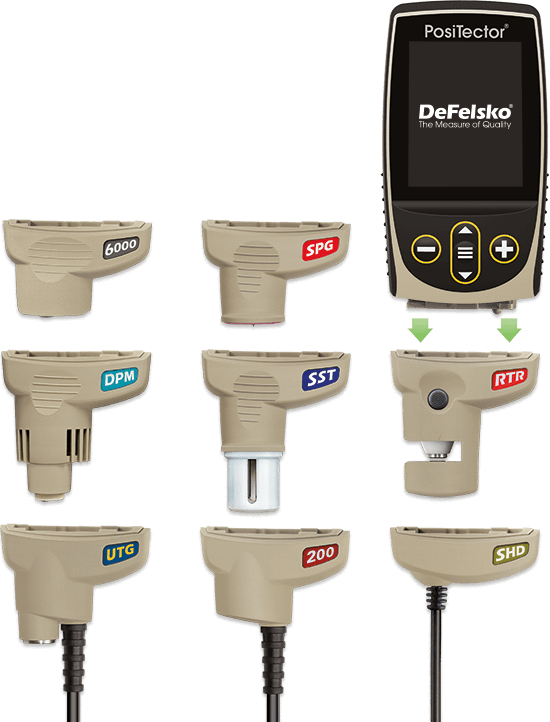PosiTector 6000
Simple, durable and accurate electronic coating thickness gauge. Measures coating thickness on all metal substrates.
Whether you’re buying a used car, inspecting a vehicle for body repairs, or checking paintwork quality in a bodyshop, paint thickness gauges (paint depth gauges) are the tools you can’t be without. By measuring coating thickness quickly and accurately, these instruments reveal hidden resprays, filler, or inconsistencies that the eye can’t see.
By measuring the thickness of paint and coatings non-destructively, these paint test instruments allow you to detect whether a vehicle has been resprayed, confirm the quality of refinishing work, or spot inconsistencies that may affect resale value. For car dealers, auction houses, buyers, and professional bodyshops, owning a reliable paint test gauge is the difference between guesswork and certainty.
At DFT Instruments, we supply the UK’s official range of DeFelsko paint test equipment, trusted globally for accuracy, durability, and ease of use. As a DeFelsko Authorised Service Centre (DASC), we also provide local calibration, certification, and ongoing support — giving you complete confidence in every measurement.

Identify Accident Damage – Quickly detect panels that have been resprayed or repaired with filler.
Protect Your Investment – Ensure vehicles are priced fairly and avoid costly surprises.
Improve Transparency – Provide buyers with documented proof of paintwork condition.
Support Bodyshops & Refinishers – Verify the consistency and quality of coatings applied during repair.
Boost Customer Confidence – Demonstrating paint thickness testing builds trust in sales and aftercare.
Comply with Best Practices – Many insurers and warranty providers expect documented inspection data.
PosiTest DFT – Lightweight, affordable, and easy to use. Perfect for used car dealers and auction houses looking for quick paint checks.
PosiPen – A simple magnetic gauge, requiring no batteries. Compact and reliable for spot checks on ferrous substrates.
PosiTector 6000 – Advanced digital gauge with data storage and reporting features. Favoured by professional refinishers, insurers, and high-value car dealerships.
Official UK Distributor of DeFelsko – Genuine instruments with full warranty and certification.
UK Calibration & Service – Supplied with a traceable calibration certificate at no extra cost.
Fast Turnaround – Recalibration and servicing carried out locally, often within one working day.
Trusted Since 1998 – Over 25 years supporting automotive, industrial, and inspection professionals.
Wide Range of Options – From entry-level testers to professional-grade gauges with data logging.
Expert Support – Speak directly to our UK team for guidance on choosing and using your gauge.
A paint test gauge measures the thickness of paint or coating layers applied to a vehicle. By comparing readings across different panels, you can detect resprays, filler, or inconsistencies that suggest past bodywork.
Car dealers, used car buyers, auction houses, insurance assessors, and professional bodyshops all rely on paint test equipment. Whether you’re checking for accident damage or validating refinishing quality, a gauge provides fast, objective data.
Both measure coating thickness, but the term paint depth gauge is commonly used in the automotive world, while coating thickness gauge is the standard term in industrial inspection. The instruments themselves often overlap — it’s about the application.
Yes. Many modern vehicles use aluminium body panels, and our gauges are designed to measure on both ferrous and non-ferrous metals. The PosiTector 6000, for example, automatically detects the substrate and adjusts measurement mode.
Yes. If filler has been applied beneath the paint, the gauge will show a much higher thickness than normal factory-applied coatings. This makes it easy to spot hidden repairs.
No. Most gauges are simple to operate and designed for non-specialists. The PosiTest DFT and PosiPen are especially straightforward, while the PosiTector 6000 offers advanced features for professionals who want data logging and reporting.
All gauges supplied by DFT are calibrated to international standards and supplied with a traceable calibration certificate. The PosiTector 6000, for instance, is accurate to within microns and suitable for professional inspection work.
Factory paint finishes are usually between 80–160 μm, depending on the manufacturer and number of layers. Significantly higher readings may indicate resprays or filler, while very low readings could suggest sanding or polishing damage.
Yes, like any precision instrument, calibration ensures accuracy over time. As the UK DeFelsko Authorised Service Centre, DFT provides fast, traceable calibration with a certificate included.
Basic gauges like the PosiTest DFT and PosiPen are intended for quick checks. Advanced models like the PosiTector 6000 allow you to store, download, and share results, making it easier to provide customers with documented inspection reports.
Whether you’re buying cars, inspecting repairs, or validating paintwork, DFT Instruments has the right paint test gauge for your needs.
📞 Need help choosing? Reach out to our UK team. 01442 879494 or Complete the form.